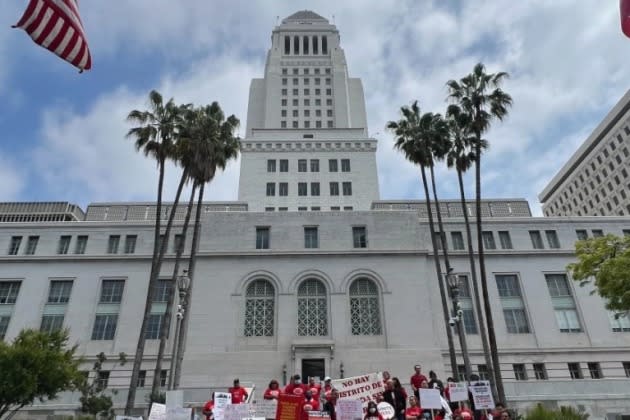U.S. Fashion Manufacturing Hubs Share Success of Worker-owned Models

In a knowledge-sharing webinar Tuesday, grassroots fashion hub leaders talked about ecosystem development in fashion.
At the heart of the discussion was worker-owned models, wherein workers have ownership of their workplace. Organization leaders from Democracy at Work Institute, the Garment Worker Center to The Industrial Commons were involved. Democracy at Work Institute, for one, pushes forward worker-owned models and ecosystem development in fashion areas such as New York, the Carolinas and Los Angeles. The organization does so by way of policy, land use and workforce development programs. Similarly, The Industrial Commons helps found and scale worker-owned social enterprises and industrial cooperatives.
More from WWD
Hollywood Unlocked's Impact Awards 2023 Red Carpet With Chloe Bailey, Tiffany Haddish and More
Essence Festival of Culture Throughout the Years: Performances, Panels, Stars and More
“We view worker co-ops as a tool to create good jobs in western North Carolina, in our region. Western North Carolina has a deep history with textiles,” Aaron Dawson, senior director of workforce development at The Industrial Commons, said in the touch-base call.
Dawson said his region (spanning Alexander, Burke, Caldwell and Catawba counties) experiences about 3 percent unemployment and poverty rates, double the national average of 11.6 percent, per the U.S. Census Bureau. “Unemployment was in double digits after [the North American Free Trade Agreement], and we’re just now starting to rebuild,” he clarified.
The Industrial Commons identified industrial expertise, sector-wide collaboration, worker ownership and community education of the next generation of workers as effective strategies. One case study Dawson spoke of was Opportunity Threads, a worker-owned cut-and-sew textile plant based in the foothills of North Carolina that boasts a 90 percent retention for sewers and just a .3 percent error rate.
He acknowledged that success isn’t only attributed to the worker-owned model, but believes: “It lays the groundwork for an environment that supports better worker conditions and better care.”
Opportunity Threads’ learnings are expanded within the Carolina Textile District, a member-based organization spanning 25 members and a sourcing library of more than 2,000 materials. Industrial Commons is the philanthropic arm funding the Carolina Textile District, while Material Return (in partnership with Smartwool) is the circularity arm or mechanical recycling investment that steers textile waste from landfill. By 2025, Industrial Commons hopes to transform the supply chain and bolster advancement of 75 North Carolinian businesses with skills advancement and the like.
In Los Angeles, meanwhile, the Garment Worker Center is looking to shift the narrative on worker protections. Some 157 brands supported SB62, or the Garment Worker Protection Act, which was signed into law in September 2021. The law marked a shift in brand-backed legislation.
“We really led the anti-sweatshop campaign here in Los Angeles,” claimed Nayantara Banerjee, industry researcher and strategist at The Garment Worker Center. The GWC also fought off rezoning laws in the city that would place new hotels in once garment manufacturing zones.
New York fashion is also seeing a shifting tide. Tessa Maffucci, assistant chair at Pratt Fashion and coordinator of the New York Fashion Workforce Development Coalition, rejected the myth that New York fashion manufacturing is no more, saying Garment District businesses are, rather, at a crossroads to lure new talent, help retirees transition and build new tech advancements.
“[Worker-centric models] are how we make these careers viable. It’s a way to change what these business structures look like and retain knowledge and skills,” said Maffucci.
Best of WWD

